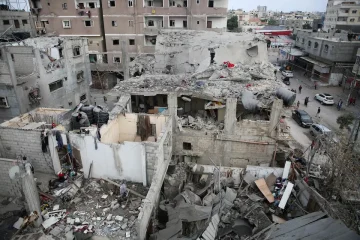ANDREAS KRANZ and LEON KUGELER
GERMAN officials rejected suggestions that they had done too little to prepare for last week’s floods and said warning systems had worked, as the death toll from the country’s worst natural disaster in almost six decades rose above 160.
Flooding has devastated parts of Western Europe since last Wednesday, with the German states of Rhineland Palatinate and North Rhine-Westphalia, as well as parts of Belgium, among the worst hit.
In the Ahrweiler district south of Cologne, at least 117 people were killed, and police warned that the death toll would almost certainly rise as the clean-up continues from floods whose costs are expected to rise into the many billions.
The high death toll has raised questions around why so many people seemed to have been surprised by the flash flooding, with opposition politicians suggesting the death toll revealed serious failings in Germany’s flood preparedness.
Seehofer said in response that the German National Meteorological Service (DWD) issues warnings to Germany’s 16 states and from there to districts and communities that decide at a local level how to respond.
“It would be completely inconceivable for such a catastrophe to be managed centrally from any one place,” Seehofer told journalists on Monday. “You need local knowledge.”
Criticism of the emergency response was “cheap election campaign rhetoric”, he said.
The devastation of the floods, attributed by meteorologists to the effects of climate change, could shake up Germany’s federal election in September, which until now had seen little discussion of climate.
A poll for Der Spiegel found only 26% thought Armin Laschet, the state premier who is the conservatives’ candidate to succeed Angela Merkel as chancellor, was a good crisis manager.
The campaign frontrunner was pilloried at the weekend for seeming to laugh while the German president delivered a solemn mourning speech.
Local authorities said that the Steinbachtal Dam visited by Seehofer – which had been at risk of breach for several days, prompting the evacuation of thousands – had been stabilised and that residents could return home later on Monday.
Armin Schuster, head of the federal disaster management agency, challenged claims that his agency had done too little, telling Reuters in an interview that it had sent out 150 warnings, but that it was for local authorities to decide how to respond.
‘TERRIFYING SCENES’
Clean-up work was continuing in the Ahrweiler district, but with many of 170 still missing thought to be in areas authorities had not yet reached or where waters had not yet receded, few were likely to be found alive.
“Our focus is on giving certainty as soon as possible,” Stefan Heinz, a senior district police officer, said. “And that includes identifying the victims.”
The worst of the flooding cut off entire communities from power or communications. Residents were trapped in their homes by fast-rising floodwaters and a number of houses collapsed, leaving what Merkel on Sunday described as “terrifying” scenes.
The DWD weather service had warned on Monday last week that heavy rain was heading to western Germany and that flooding was very likely. On Wednesday morning, it said on Twitter that the risk of flooding was increasing and called on the population to seek guidance from local authorities.
Germany is readying a relief package for hard-hit communities in North Rhine-Westphalia and Rhineland-Palatinate, and also in Bavaria and Saxony, where there were fresh floods over the weekend.
Insurers estimate the direct cost of the floods may run as high as 3 billion euros ($3.5 billion). The transport ministry estimates the cost at repairing damaged roads and railways at 2 billion euros, Bild reported.
One government source told Reuters on Monday that immediate relief worth around 400 million euros ($340 million) was being discussed, half of which would be paid by the federal government and half by the states.
The relief package, which is also expected to include billions of euros for longer-term rebuilding efforts, is due to be presented to the cabinet on Wednesday.
No new casualties were reported in Belgium, where 31 people are known to have died. The number of missing on Monday stood at 71, compared to 163 on Sunday. Some 3,700 homes were still without drinking water.
In the Netherlands, thousands of residents in the southern province of Limburg began returning home after water levels receded from record heights that threatened towns and villages across the region. Though floods left a trail of damage, all major dykes held and no casualties were reported.









